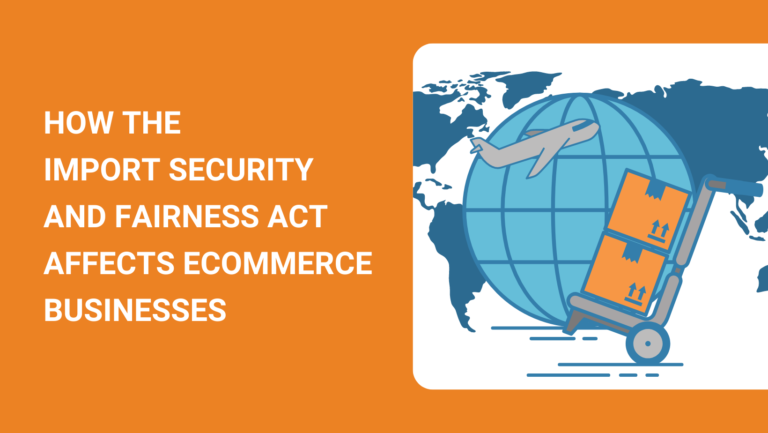The explosive consumer demand has led to a surge in the number of eCommerce businesses.
More than 36 million packages arrive in the U.S every day. Among those, over 2 million are small packages that do not cross the de minimis value threshold of $800.
However, with the announcement of the Import Security and Fairness Act, that is about to change.
Want to learn the purpose of this act, what it entails, and how it could impact the eCommerce world?
Continue reading as we discuss all that and more.
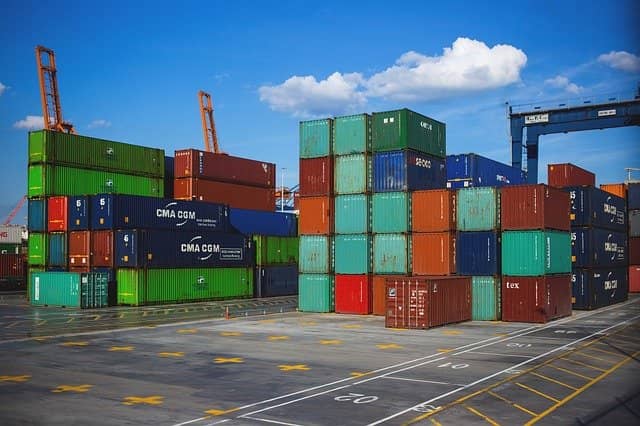
What Is the Import Security and Fairness Act?
Announced in January 2022, the Import Security and Fairness Act is new legislation that restricts de minimis shipments in the U.S.
That means, if importers cannot meet the guidelines proposed by the new bill, then they will not be eligible for the de minimis program.
De minimis is a minimum value defined by a country on which import duties and taxes will not be applicable. The threshold value in the U.S is currently set at $800 per day.
The Import Security and Fairness Act mainly targets countries like China that are both non-market economies and on the U.S Trade Representatives (USTR) Watch List.
The goal of this legislation is to strengthen the U.S import laws that are currently being exploited by the “bad actors” in the industry.
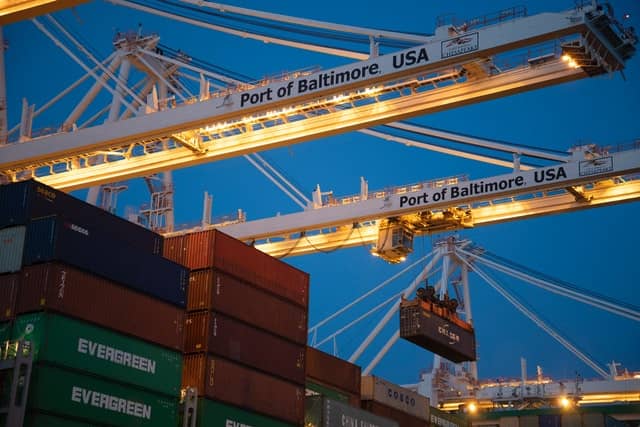
What Changes Have Been Made in the New Bill?
There have been significant changes proposed in the Import Security and Fairness Act for the shipment regulations in the U.S.
Those legislative changes include but are not limited to:
- Reversing the de minimis threshold value of $800 back to $200.
- Countries that are both (currently only China) on the United States Trade Representatives (USTR) Watch List and non-market economies will be restricted from availing de minimis benefits.
- Prohibited goods subject to enforcement actions will not be able to use the program.
- Additional data on the de minimis shipments will be collected by the U.S customs to prohibit importers that are restricted or suspended from using the program.
It’s worth noting that for now, the bill has only been announced and not passed. It has met with opposition from the National Retail Federation, the U.S. Chamber of Commerce and Express Association of America, and many others.
What Is the Purpose of the Import Security and Fairness Act?
The purpose of the Import Security and Fairness Act aims to monitor and respond to the high volume of small packages coming to the U.S.
The supporters of the bill claim that countries such as China are exploiting the de minimis program by falsely valuing the packages under $800 to avoid customs scrutiny and tariffs.
The program was meant to provide relief and ease the burden of the importers but is now being abused due to the loopholes created by bad trade actors. This bill is ultimately “a way” for the U.S to combat intellectual property theft and forced labor.
Once the bill is passed, the importers would have to go through a more formal process. The CBP will collect information on the de minimis shipments to ensure they are eligible for the program and the importers pay the duties.

How the Act Impacts the Ecommerce World?
The Import Security and Fairness Act hasn’t been approved, yet, it has shaken up the world of eCommerce. Let’s go over some of the major impacts in case the subsequent bill is passed:
Impacts on Small Parcel Shipping Carriers
Small parcel shipping carriers will be affected the most if the bill passes the Congress.
Most don’t have the finances and resources to ship higher-value goods.
If they aren’t eligible for the program then they would have to pay heavy custom duties and tariffs.
This would force them to increase the prices of their services, slashing both their profit and customers.
Impacts on Freight Shipping Carriers
Freight shipping carriers mostly remain unaffected and may even benefit the most from this bill as their shipments usually weigh over 150 lbs, which is likely to cross the $800 threshold anyway.
Although the U.S government levies tax on freight imported products, you may receive a discount on bulk shipments. This may even ultimately allow freight shipping carriers to offer better rates than small parcel shipping carriers.
Most of their vendors and partners would also place bulk orders, lowering the operational costs of freight carriers and increasing their profits.
Impacts on Sellers Who Rely on Small Parcel Shipping
Sellers who rely on small parcel shipping would ultimately have to change their business model and find other shipping methods from China to the U.S.
The new bill would sky-rocket the shipment costs and eat away at their profit.
Increasing the price of the products may not help either as that would only make them lose customers.
The only solution for them would either be to increase the minimum shipping prices or to get the help of freight shipping carriers.
Impacts on Ecommerce Platforms
The impact of this bill on eCommerce platforms depends on a couple of factors such as:
- The location of the platform’s warehouses.
- Where the majority of its merchants are situated.
- The manufacturing factories (if any) of the platform.
Chinese platforms like AliExpress and Shein may severely be affected as most merchants on these sites have factories in China. Importing their product to U.S merchants would subject them to heavy custom duties and tariffs.
On the other hand, American eCommerce platforms like Amazon, eBay, and Wish would mostly remain unaffected as a large number of their merchants are U.S based.
They might even benefit from the bill because it would become more difficult for customers to order cheap products directly from Chinese marketplaces.
How Sellers Should Respond to the Act?
Planning ahead is an important part of running a successful eCommerce business. Let’s discuss how the sellers should respond to the act, in case the bill passes:
1) Use Freight Shipping
The Import Security and Fairness Act would impact small shipping carriers the most and may even lead them to bankruptcy.
So the first thing you need to look for as a seller is to find a shipping alternative. Switching to freight shipping services would be the ideal approach and help you keep your business afloat.
Although the rates offered by a freight company wouldn’t be the same as your previous shipping service, at least, you’d have an alternative.
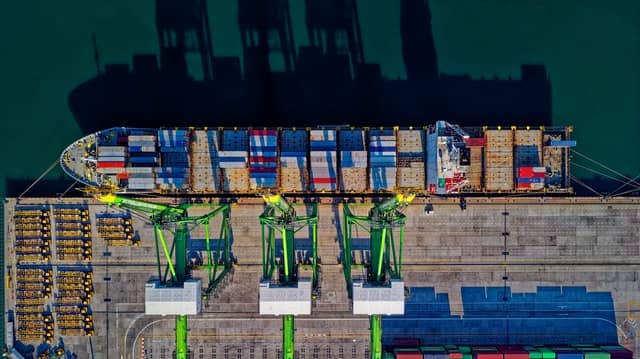
2) Have Fulfillment Centers in the U.S
Fulfillment centers can help you significantly reduce shipping costs. That’s because you would be sending your inventory in bulk, which will help you get discounts from freight shipping services.
If you’re planning to expand your business, then we recommend finding a product sourcing and fulfillment service with warehouses in the U.S.
This will allow you to save a ton of money as you won’t have to ship the products every time a customer places an order. In addition, the order fulfillment time would also significantly improve as your products would already be in the U.S.
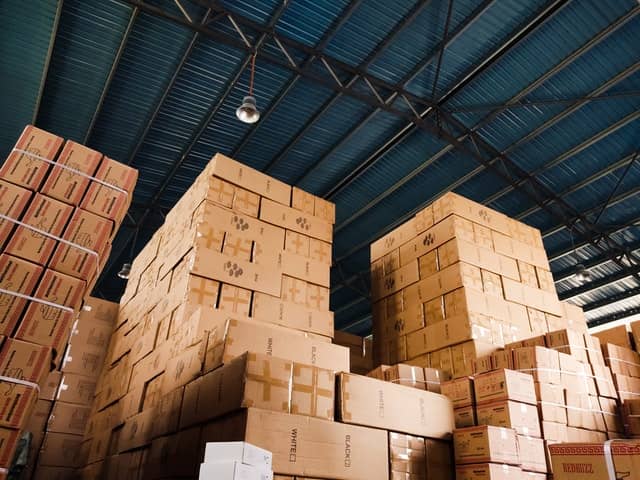
3) Shipping from Neighboring Countries
Shipping from China may not be a feasible option if the Import Security and Fairness Act passes because you won’t be eligible for the de minimis program.
However, what you can do instead is to ship from a neighboring country that would be able to use de minimis.
You would only have to worry about finding a warehousing solution in the neighboring country. Other than that, everything would pretty much remain the same.
FAQs about Import Security and Fairness Act
How Will the U.S Sellers Benefit from the Import Security and Fairness Act?
The supporters of ISFA claim that passing the bill will level the playing field. Chinese sellers won’t be able to sell their products at insanely discounted prices. That would compel customers to shop more from the U.S marketplaces.
How Would the Import Security and Fairness Act Affect Consumers?
One of the key points of the opposition to the bill is that consumers would be negatively impacted because they would have to pay a higher price to purchase the product.
Domestic manufacturers who procure imported goods using the $800 threshold value would also be affected.
Which Country Will the Import Security and Fairness Act Impact the Most?
China will be impacted the most by the Import Security and Fairness Act. The bill mainly targets countries that are both non-economic markets and are on the U.S Trade Representatives Watch List, which China often is.
Final Thoughts
The Import Security and Fairness Act has shaken up the eCommerce world.
Although Congress has yet to pass the reform, it’s essential for eCommerce entrepreneurs who rely on de minimis to prepare for the worst.
The best approach to this change would be to source products from a company with fulfillment centers in the U.S.
This is where NicheDropshipping comes in as we have warehouses in both China and the U.S.
Even if the bill passes, we would be able to help you import and store products in the U.S at competitive prices.
All you have to do is give us a call and our agents will promptly guide you!
